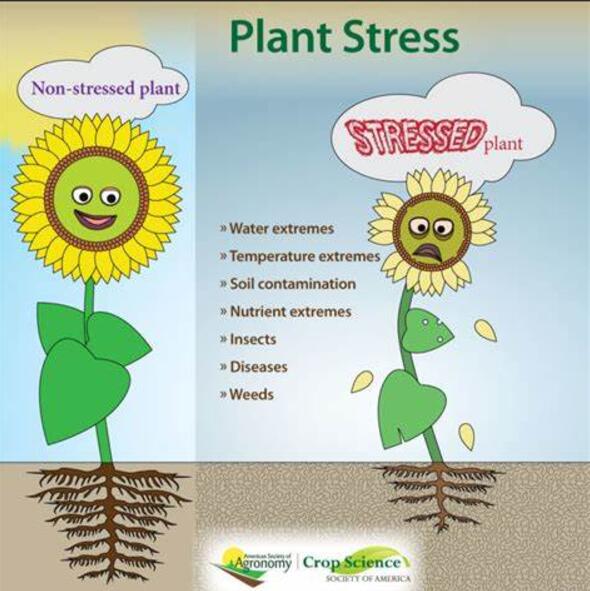耐旱芽孢杆菌 FD48 释放的植物生长促进标志性挥发物及其在缓解水稻(Oryza sativa L.)水分胁迫中的作用
IF 6.8
Q1 PLANT SCIENCES
引用次数: 0
摘要
越来越多的证据表明,细菌挥发性有机化合物(bVOCs)在植物与微生物的相互作用中发挥着重要作用。与植物相关的细菌会产生调节植物生长的挥发性物质,诱导植物对多种非生物胁迫产生系统耐受性(IST)。本研究报告了高度芽孢杆菌(Bacillus altitudinis)FD48 的标志性 bVOCs 对干旱的诱导系统耐受性和植物生长的促进作用。在诱导水分胁迫下,暴露于 FD48 bVOCs 混合物的水稻幼苗的全株生物量和辅酶含量(3 µmol g-1 FW)均增加了 1 倍。bVOCs 的效果在很大程度上取决于接种量。通过 GC-MS-ATD 分析 FD48 在不同生长期产生的 bVOCs,发现在胁迫(PEG 6000)和非胁迫条件下共有 40 种生物活性化合物。有趣的是,潜在的促进植物生长的化合物,如 1-己醇、2,3-丁二醇、二甲基二硫、苯、丁酸、十五烷和乙酸等更为明显。发现在非胁迫条件下产生的少数化合物在胁迫条件下会增加(例如,2,3-丁二醇和乙酸)。这项研究揭示了 FD48 bVOC 混合物诱导的重要生物合成途径,如丙酮酸代谢、色氨酸代谢、硫代谢、脂肪酸生物合成和乙醇降解,这些途径在缓解水分胁迫方面发挥着重要作用。因此,可以得出结论,PGPB B. altitudinis FD48 产生的 bVOCs 可能是诱导植物系统耐受水分胁迫的潜在协调者。本文章由计算机程序翻译,如有差异,请以英文原文为准。
Plant growth promoting signatory volatiles emitted by a drought-tolerant bacterium Bacillus altitudinis FD48 and its role in moisture stress alleviation in rice (Oryza sativa L.)
Increasing evidence implies that bacterial volatile organic compounds (bVOCs) play a significant role in plant-microbe interaction. Plant associated bacteria produces plant growth modulating volatiles elicits induced systemic tolerance (IST) in plants against a multitude of abiotic stress. Induction of IST and plant growth promotion by signatory bVOCs of Bacillus altitudinis FD48 against drought are reported in this study. The rice seedlings exposed to bVOCs blends of FD48 showed a one-fold increase in whole plant biomass and auxin content (3 µmol g-1 FW) under induced moisture stress. The effect of bVOCs highly depends on the inoculum load. Higher inoculum quantity (100 µL) is detrimental to plant growth. bVOCs produced by FD48 profiled at different growth intervals in GC–MS-ATD revealed a total of 40 bioactive compounds both under stress (PEG 6000) and non-stressed conditions. Interestingly, potential plant growth-promoting compounds such as 1-Hexanol, 2,3-butanediol, dimethyl disulfide, benzene, butanoic acid, pentadecane, and acetic acid are more pronounced. Few compounds produced under non-stress were found to increase during stress (example, 2,3-Butanediol, and acetic acid). This study unraveled the significant biosynthetic pathways induced by FD48 bVOC blends, such as pyruvate metabolism, tryptophan metabolism, sulfur metabolism, fatty acid biosynthesis, and ethanol degradation that anchors in abating moisture stress. Hence, it can be concluded that PGPB B. altitudinis FD48 produced bVOCs could be potential orchestrators of induced systemic tolerance in plants against moisture stress.
求助全文
通过发布文献求助,成功后即可免费获取论文全文。
去求助
来源期刊

Plant Stress
PLANT SCIENCES-
CiteScore
5.20
自引率
8.00%
发文量
76
审稿时长
63 days
期刊介绍:
The journal Plant Stress deals with plant (or other photoautotrophs, such as algae, cyanobacteria and lichens) responses to abiotic and biotic stress factors that can result in limited growth and productivity. Such responses can be analyzed and described at a physiological, biochemical and molecular level. Experimental approaches/technologies aiming to improve growth and productivity with a potential for downstream validation under stress conditions will also be considered. Both fundamental and applied research manuscripts are welcome, provided that clear mechanistic hypotheses are made and descriptive approaches are avoided. In addition, high-quality review articles will also be considered, provided they follow a critical approach and stimulate thought for future research avenues.
Plant Stress welcomes high-quality manuscripts related (but not limited) to interactions between plants and:
Lack of water (drought) and excess (flooding),
Salinity stress,
Elevated temperature and/or low temperature (chilling and freezing),
Hypoxia and/or anoxia,
Mineral nutrient excess and/or deficiency,
Heavy metals and/or metalloids,
Plant priming (chemical, biological, physiological, nanomaterial, biostimulant) approaches for improved stress protection,
Viral, phytoplasma, bacterial and fungal plant-pathogen interactions.
The journal welcomes basic and applied research articles, as well as review articles and short communications. All submitted manuscripts will be subject to a thorough peer-reviewing process.
 求助内容:
求助内容: 应助结果提醒方式:
应助结果提醒方式:


